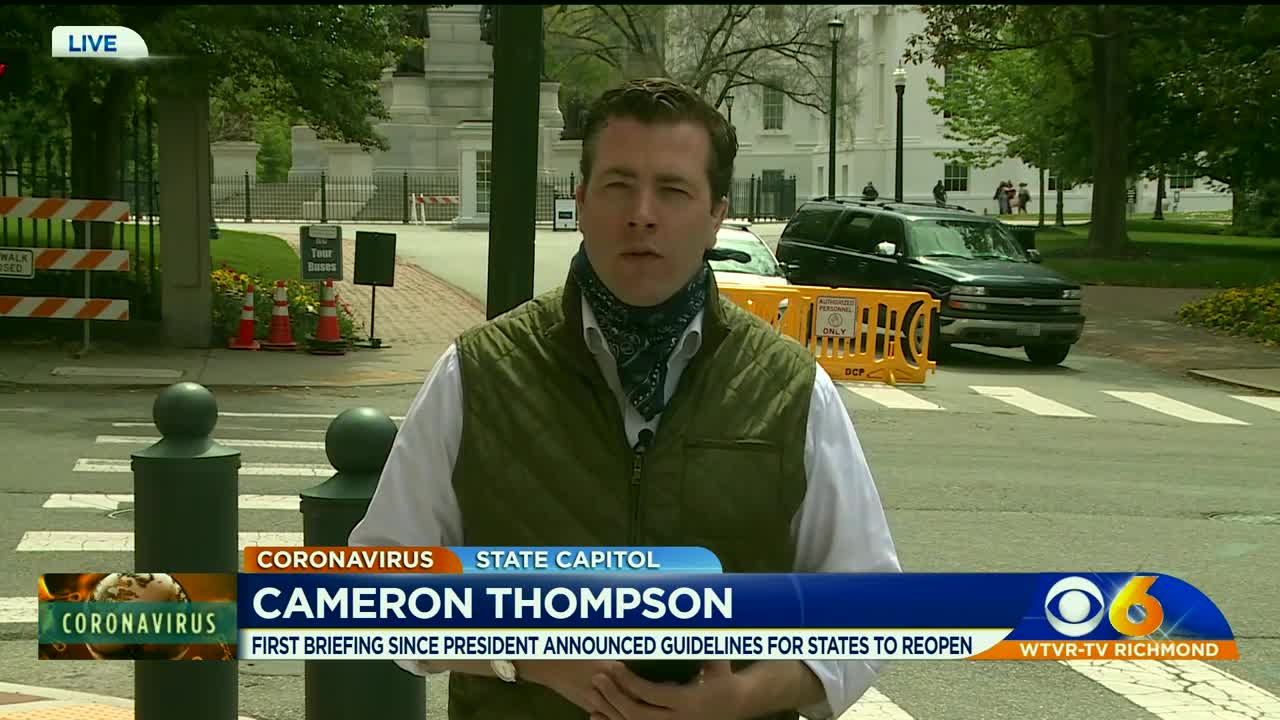RICHMOND, Va. -- Virginia Governor Ralph Northam said science, data and testing will dictate when the Commonwealth reopens for business amid the COVID-19 global pandemic.
"I assure you, I want to get back to a place where all businesses can be open -- and we will get there," Northam said during a Friday news briefing. "But we have to do it with deliberation... to make sure that we do it safely. Otherwise, cases will spike. We'll be right back where we started, and all the sacrifices people have already made will have been for nothing."
Northam noted for Phase One of the CDC's guidance on reopening, a state would need to have 14 days of declining coronavirus cases.
"As you've heard the data today, we had 602 new cases, which is an increase of about 8 percent," Northam said. "So we're not close to that."
Additionally, Northam said that adequate testing would be needed to reopen Virginia.
"We need to be able to test. We need to be able to track and we need to be able to isolate individuals looking at hotspots -- knowing the trend of this pandemic, and what this virus is doing," Northam said. "We are working to improve that on a daily basis. But one of the things... is that we have no national guidance on testing."
The news conference comes as the Virginia Department of Health reports the number of positive cases in the Commonwealth increased to 7,491, 1,221 people have been hospitalized, and 231 people have died (an increase from 208 on Thursday). A total of 48,997 people have been tested (an increase from 46,444 on Thursday).
Meanwhile, the Virginia Hospital and Healthcare Association dashboard tracking COVID-19 in the state’s hospitals reports there are currently 1,308 patients in hospitals who are either positive or whose test results are pending (a decrease from 1,337 on Thursday), while 1,110 patients have been discharged (an increase from 951 on Thursday).
It added 22% of the ventilators on-hand in the state are currently in use (a decrease from 25% on Thursday).
Here are some topics Northam may address since his last news conference on Wednesday:
- A protest of about 50 people outside the Governor’s mansion on Thursday, where attendees called on Northam to end his ExecutiveOrders that have led to a stay-at-home order and the closures of schools, many businesses, and beaches. The protest came a day after Northam announced he was extending Executive Order 53, which encompassed some of those closures, until May 8.
- President Donald Trump and m,embers of the White House coronavirus task force unveiled a three-phase guideline on how to reopen economies. The President said it would be up to governors on when to reopen.
- New data released by the U.S. Department of Labor showed more than 100,000 Virginians filed unemployment claims in the last week. Overall, more than 415,000 claims have been filed in the last month, which accounts for about 9% of Virginia’s workforce.
- The Virginia Coronavirus Task Force is warning residents who are getting their stimulus checks in the mail to be aware of scammers. They warn scammers are using “phishing techniques, including text messages, emails, and letters delivered through the mail, to steal personal information or swindle residents out of their checks.”
COVID-19 Precautions
Most patients with COVID-19 have mild to moderate symptoms. However, in a small proportion of patients, COVID-19 can lead to more severe illness, including death, particularly among those who are older or those who have chronic medical conditions.
COVID-19 spreads primarily through respiratory droplets produced when an infected person coughs or sneezes.
Symptoms include fever, cough, and difficulty breathing. Symptoms appear within 14 days of being exposed to an infectious person.
Virginia health officials urged the following precautions:
- Wash your hands often with soap and water for at least 20 seconds.
- Use an alcohol-based hand sanitizer only if soap and water are not available.
- Avoid touching your eyes, nose, and mouth.Cover your mouth and nose with a tissue or your sleeve (not your hands) when coughing or sneezing.
- Clean and disinfect frequently touched objects and surfaces.Stay home when you are sick.
- Avoid contact with sick people.Avoid non-essential travel.







